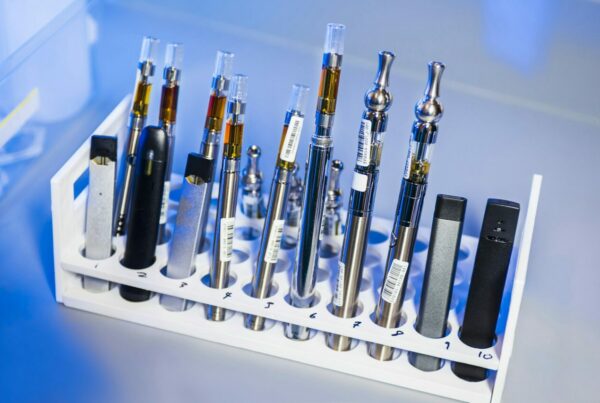N, N-Dimethyltryptamine (DMT) is a compound commonly found in both plants and animals, known for its brief yet potent psychedelic effects when ingested.
There is growing evidence suggesting that DMT, which occurs naturally in the body, plays important roles in both the peripheral and central nervous systems, possibly functioning as a neurotransmitter.
DMT can produce strong psychedelic effects, but typically does not result in numerous negative effects, apart from potential cardiovascular problems when given in large doses through injection.
Let’s explore DMT and its many roles; from recreational use to its promising implications in scientific research and therapeutic applications.

A Brief Introduction to DMT: What is it?
| Aspect | Details |
| Name | N, N-Dimethyltryptamine (DMT) |
| Classification | Indole alkaloid |
| Occurrence | Naturally found in a variety of plants and animals |
| Psychoactive Effects | Produces brief, intense psychedelic experiences when ingested. |
| Method of Consumption | Can be smoked, injected, or taken orally. |
| Duration of Effects | Relatively short, typically lasting between 5 to 30 minutes. |
| Chemical Structure | Comprises a tryptamine core with two methyl groups attached to the amine nitrogen atom. |
| Metabolism | Rapidly metabolized by the body, broken down by monoamine oxidase (MAO). |
| Cultural Use | Historically used in various ceremonial and shamanic rituals by indigenous cultures. |
| Other names | Dimitrifantasiabusinessman’s trip, Businessman’s special, 45-minute psychosis, spiritual molecule |
The Role of DMT in Mental Health
N, N-Dimethyltryptamine (DMT), a compound famous for its strong psychedelic effects, is drawing attention for its potential benefits to mental health. Although traditionally known for inducing powerful visionary experiences, recent research suggests a connection between DMT and mental well-being.
Effects on Psychological and Emotional Health and Wellness
DMT, known for its psychedelic effects, triggers significant emotional responses and alters states of consciousness. This might pave the way for new therapeutic methods to address mental health concerns, aid in emotional processing, and offer fresh perspectives on personal traumas.
Neuroplasticity and Brain Function
Research suggests that DMT might influence neuroplasticity, enhancing the brain’s ability to adapt and restructure. Understanding its impact on synaptic plasticity and neural connectivity might lead to potential treatments for conditions linked to neural misalignment.
Potential Therapeutic Use for Mental Health Disorders
Initial studies suggest that DMT could be beneficial in treating conditions such as depression, addiction, and PTSD. Its ability to evoke mystical or spiritual experiences may offer a unique psychotherapeutic approach and help in reshaping negative thought patterns.
The natural presence of DMT within the body plays a crucial role in mental health resilience, stress response, and overall psychological well-being. Understanding how the body regulates internal DMT levels could lead to new therapeutic strategies.
DMT and Mental Health Disorders
| Mental Health Disorder | Characteristics | DMT’s Potential Effectiveness | Possible Benefits |
| Depression | A mood disorder marked by persistent sadness, lack of interest, and reduced motivation | Early research suggests DMT could help alleviate symptoms by initiating deeply emotional experiences. | DMT’s rapid onset and ability to provoke transformative experiences could offer innovative therapeutic approaches for reshaping negative thought patterns and enhancing emotional processing |
| Post-Traumatic Stress Disorder (PTSD) | A mental health disorder triggered by traumatic events, resulting in flashbacks, severe anxiety, and intrusive thoughts | Preliminary research indicates that DMT might help manage symptoms by initiating spiritual or mystical experiences that could help patients reframe traumatic memories | The ability of DMT to induce altered states of consciousness could facilitate emotional processing and offer a fresh perspective on traumatic experiences |
| Addiction | A complex disorder characterized by compulsive engagement in rewarding stimuli, despite adverse consequences | Some studies suggest DMT could play a role in interrupting addictive patterns and reducing cravings for substances | The potential of DMT to trigger intense and transformative experiences could help individuals modify their behavioural patterns and address understanding the underlying triggers of their addiction |
Approach to Using DMT
DMT, renowned for provoking short yet profound psychedelic experiences, can be utilized in a variety of ways. The chosen method of use typically depends on the desired intensity and length of the psychedelic journey.
Inhalation:
When inhaled through a pipe or vaporizer, DMT requires careful temperature control to avoid overheating and combustion of the compound. The psychedelic effects are nearly instantaneous when DMT is inhaled and typically last from 5 to 15 minutes.
Oral Consumption:
Consuming DMT orally leads to slower onset effects that can last several hours. This extended duration is due to the slower metabolism of DMT when combined with an MAOI.
Intravenous Use:
DMT can be injected directly into the bloodstream for quick and potent effects.
This method produces an immediate and intense journey, but it necessitates precise dosage management and comes with higher risks.
Insufflation (Snorting):
Snorting DMT results in a more gradual onset of effects compared to inhalation but might provide a longer-lasting journey.
Sublingual or Buccal Use:
When absorbed through the oral mucosa, this method offers an alternative to inhalation and provides a prolonged, although less intense, experience.
Determining Therapeutic Dosage: N, N-Dimethyltryptamine (DMT)
For inhalation, the suggested dosage is between 20 to 40 mg, while for intravenous application, the recommended dosage is 0.2 to 0.4 mg per kg of body weight. These dosage guidelines are primarily used in clinical research and are particularly important for intravenous application.
- Higher doses given intravenously are associated with vivid visuals, temporary loss of control, and a combined feeling of anxiety and euphoria
- Interestingly, lower doses have demonstrated less desirable effects
- Recreational doses of inhaled DMT usually range from 40 to 50 mg, sometimes even going up to 100 mg
- Different doses of intravenous People who have used DMT (7, 14, 18, and 20 mg solutions) in near-death experiences have reported significant and enduring enhancements in their psychological health.
Availability of DMT
ProductsOsmosis – 4-ACO-DMT Ethereal Essence Tincture
This tincture is marketed to contain 4-Acetoxy-N, N-dimethyltryptamine (4-AcO-DMT), a version of DMT. Tinctures are liquid extracts designed for oral intake, and this particular product might offer a different experience compared to regular DMT.
Lucid Supply Co. – 5-MeO DMT Vaporizer
This product is a vaporizer that delivers 5-Methoxy-N, N-dimethyltryptamine (5-MeO-DMT). Known for its potent, transformative, and often short-lived experiences, 5-MeO-DMT is the active compound.
Integral Alchemist – Acacia – 1ml DMT Vape Cartridge
Integral Alchemist’s DMT vape cartridge is pre-filled with N, N-Dimethyltryptamine. This product is apparently aimed at those who prefer a discreet and convenient method of DMT consumption.
Deadhead Chemist – 5-Meo-DMT Cartridge
This cartridge houses 5-Methoxy-N, N-dimethyltryptamine (5-MeO-DMT), a compound known for its deep and powerful effects.
Potential psychological health benefits might be associated with personal growth, spiritual experiences, or therapeutic applications intended to enhance emotional well-being.
Deadhead Chemist – N, N DMT Cartridge
Another offering from Deadhead Chemist, this cartridge contains the traditional N, N-Dimethyltryptamine. Cartridges provide a user-friendly method of DMT consumption, ensuring a more consistent and controlled experience.
Concluding Remarks
The application of N, N-Dimethyltryptamine (DMT) in
How can one ensure safety while using DMT for mental health?
It’s vital to prioritize safety, which involves thoroughly researching the compound, comprehending its impacts, and consulting with mental health professionals or experienced users.
Appreciating personal tolerance levels and mental preparedness is equally crucial, as is creating a supportive and secure environment for the experience.
Mental health therapy is a complex and fascinating journey. The ability of certain compounds to provoke intense, albeit brief, psychedelic experiences opens the door to innovative therapeutic approaches.
Initial studies indicate their potential involvement in emotional processing, personal development, and possibly
The profound influence of mental health therapy demands careful consideration and responsible use.
For individuals keen to responsibly explore DMT products, reliable resources such as Magic Mushrooms Ottawa Canada Online Dispensary can provide advice and a variety of choices.
Frequently Asked Questions:
How do various DMT products affect mental health differently?
For instance, vaporizers may yield immediate effects, while tinctures or vape cartridges might provide more controllable and consistent doses.
Incorporating derivative compounds or 5-MeO-DMT can result in different intensity levels and mental health effects.
These nuanced differences underscore the importance of selecting a DMT product based on individual needs and mental health goals.
Can DMT facilitate enduring changes in mental health and personal growth?
There are anecdotal reports that suggest DMT-induced experiences could have long-term effects on mental health and personal development.
Profound or transformative experiences, such as those similar to near-death experiences, are often associated with ongoing positive changes in psychological health and personal evolution.
Despite these experiences being intense and short-lived, they often prompt self-exploration, spiritual revelations, and a sense of unity or enlightenment.
Users frequently report a revitalized perspective on life, enhanced emotional resilience, and a heightened appreciation for existence after these experiences.
What is the optimal strategy for using DMT for mental health?
Key to this is making well-informed decisions, which involve comprehensive research and understanding the effects of the compound.
Advice from mental health professionals or seasoned users can offer crucial insights into potential risks and advantages.
Gauging personal tolerance and mental readiness is also essential, as well as ensuring a supportive and safe setting for the experience.
How does DMT stand against other psychedelic therapies like psilocybin or LSD in mental health treatment?
DMT’s effects, length, and intensity vary from other psychedelics such as psilocybin or LSD. It has a notably brief duration.
The distinctive experiences offered by short-lasting, intense psychedelics require unique therapeutic methods in mental health, which differ from the strategies used for longer-lasting psychedelics.
Recommended Additional Reading:





